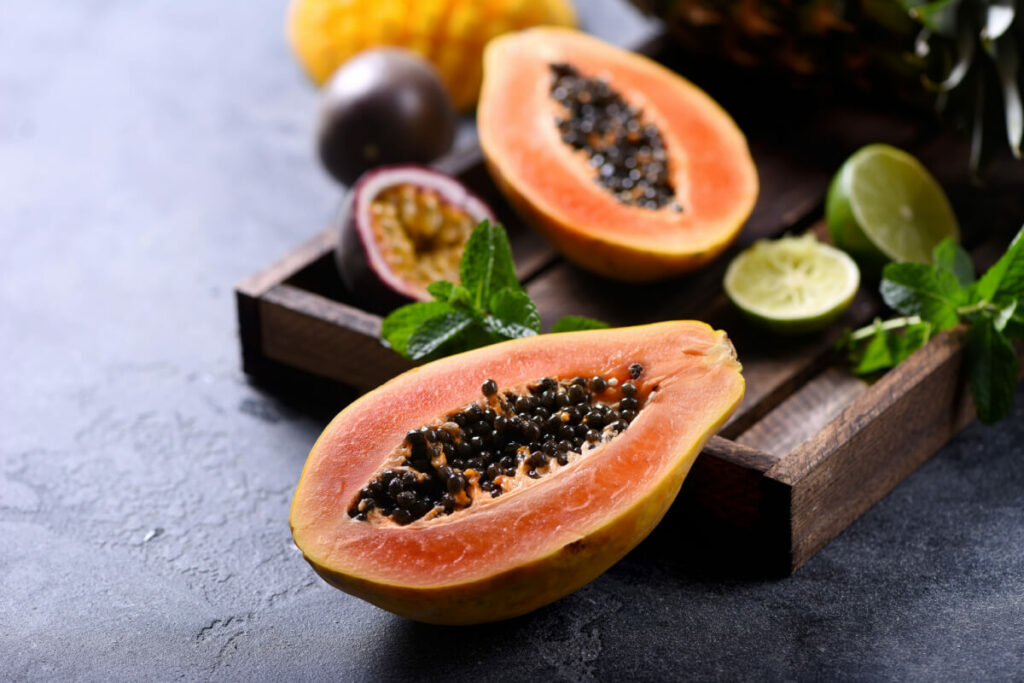Enzymes are essential to good health. In fact, these biologically active proteins play a key role in every single function that occurs in the human body. Although there are thousands of different enzymes that speed up chemical reactions throughout the body, affecting everything from digestion and nutrient absorption, to respiration, one of the most important types of enzymes are proteolytic enzymes.
Continue reading to learn more about proteolytic enzymes, including their common sources and benefits.

Start using supplements in clinical practice
What are proteolytic enzymes?
Proteolytic enzymes, also known as proteases, help you break down and digest protein in the foods you eat. The word protease comes from a combination of the term pro- (for protein) and -ase (a Greek word meaning ‘to separate’). They are also essential for many important processes in the body, including cell division, blood clotting, immunity, and protein recycling. (19)
While the body produces its own supply in the pancreas, proteolytic enzymes can also be found in certain foods and supplements. (21)
Did you know? The three main proteolytic pancreatic enzymes are trypsin, chymotrypsin, and carboxypeptidase. (21)

Finding proteolytic enzymes in food
Although these protein-digesting enzymes are naturally produced by the body, proteolytic enzymes can also be found naturally in certain foods. Two common sources are papayas and pineapples. (3)(22)
Papayas contain papain, a proteolytic enzyme that effectively breaks protein down into its amino acids. That’s one reason it has traditionally been used to tenderize meat. (3) Pineapples, on the other hand, provide another proteolytic enzyme bromelain. Studies suggest that bromelain may be used therapeutically in a variety of conditions from respiratory problems to digestive upset. (22)
While papayas and pineapples are the best-known dietary sources, the following foods also contain proteolytic enzymes:
Did you know? Fermented foods are a great source of proteolytic enzymes. (15)
Proteolytic enzymes supplements
You can also find proteolytic enzymes in dietary supplements. Some dietary supplements are single-enzyme formulations, while others contain multiple types of proteolytic enzymes, which may be derived from plant and animal sources, such as:
- Bromelain
- Chymotrypsin
- Pancreatin
- Peptidase
- Papain
- Trypsin
Another common supplement formulation is pancreatin, which is actually a mixture of protease (to break down proteins), amylase (to break down carbohydrates), and lipase (to break down fats). While bromelain and papain come from fruit, chymotrypsin, pancreatin, and trypsin are typically derived from the pancreas of pigs and cows. (6)
Proteolytic enzyme supplements can be beneficial for individuals who can’t produce enough of their own enzymes. However, it’s always a good idea to seek guidance from a healthcare practitioner before starting a new supplement. In addition, when choosing a supplement, be aware that enzymes aren’t always measured in milligrams, international units, or other measures of weight. Instead, they are measured by units of potency and activity. Common units of measurement include HUT, USP, and SAP. These units of measurement are regulated under the Food Chemical Codex (FCC) and are accepted by the U.S. Food and Drug Administration. (6)
Potential health benefits of proteolytic enzymes
Proteolytic enzymes have several potential health benefits.

1. Proteolytic enzymes for digestion
Improving digestion is the most common reason individuals take supplemental proteolytic enzymes. While most people only need occasional support, those with cystic fibrosis, certain types of cancer, such as colon, pancreatic, or stomach cancer, inflammatory bowel disease, irritable bowel syndrome, pancreatic exocrine insufficiency (a condition in which an individual can’t produce enough of their own enzymes), and those who have undergone gastrointestinal surgery, often require therapeutic doses to replace the missing enzymes. (18)(23)
Preliminary animal research shows that the proteolytic enzymes in kiwifruit may improve digestion by breaking down the proteins found in meat, poultry, fish, eggs, and dairy products. (11)(17) One randomized double-blind clinical trial involving 40 patients suffering from digestive upset found that taking a proteolytic enzyme supplement eased digestive symptoms including abdominal pain, belching, bloating, heartburn, and loss of appetite. (13)
2. Proteolytic enzymes for inflammation
Proteolytic enzymes don’t just aid digestion; they also possess anti-inflammatory properties. For example, when researchers injected proteolytic enzymes into test animals, they found that the enzyme chymotrypsin was effective in healing tissue damage as a result of its anti-inflammatory and antioxidant properties. (24)(26)
Proteolytic enzymes have also been shown to benefit a number of inflammatory conditions. In one review study, researchers found that bromelain effectively reduced inflammation and stiffness in individuals with osteoarthritis. (5) Another study that appeared in the journal Clinical Rheumatology compared a multienzyme supplement with the prescription non-steroidal anti-inflammatory drug diclofenac in a group of 103 patients with osteoarthritis of the knee. The study found that 51.4% of those taking the proteolytic enzymes experienced reduced inflammation and greater function compared to just 37.2% of those taking the diclofenac. (1)
Proteolytic enzymes may also be beneficial for alleviating inflammation and related pain in other conditions, including sinusitis and dental surgery-related inflammation. (2)(4)

3. Pain and proteolytic enzymes
Several studies suggest that proteolytic enzymes can reduce several types of pain. One double-blind study reported that proteolytic enzyme supplementation containing rutin resulted in a modest reduction in chronic neck and shoulder pain. (28)
Supplementing with proteolytic enzymes appears to be a particularly effective way to ease delayed-onset muscle soreness (DOMS), often experienced after a tough workout. In one clinical trial, 20 runners began taking a proteolytic enzyme supplement or a placebo, starting one day before participating in a downhill run and continuing for two days after the run. Individuals taking the supplement experienced significantly less DOMS compared to those taking the placebo. They also had less stiffness and better mobility after the run. (16)
Proteolytic enzyme supplementation has also been shown to ease low back pain associated with lumbar spine osteoarthritis. In a six-week study of 40 men and women suffering from lumbar spine osteoarthritis, those taking proteolytic enzymes experienced a marked decrease in pain compared to those taking a traditional non-steroidal anti-inflammatory drug (NSAID). Additionally, they didn’t report the gastrointestinal side effects commonly experienced with NSAID intake. (22)
Did you know? The amount of enzymes produced by your body declines with age. (11)
Proteolytic enzymes side effects
Proteolytic enzyme supplements are considered safe in most people. However, some individuals may be allergic to certain proteolytic enzymes. (14) Chronic use of pancreatin may also result in a folic acid deficiency. (12)
Furthermore, it’s always recommended to check with your healthcare professional if you are taking medication. Some proteolytic enzymes like bromelain or papain may interfere with certain blood-thinning drugs like warfarin. (9) Papain can also increase blood concentrations of certain antibiotics. (7) Lastly, it’s important to seek advice as to whether enzyme supplements are right for you; if you do not feel better from taking enzymes or have been taking them for a long time, it could be a sign that something more serious is going on that should be investigated.
The bottom line
Although the body produces its own supply of proteolytic enzymes, the effects of aging and some health conditions can contribute to enzyme deficiency. Adding proteolytic enzymes from dietary sources or supplements can help you digest and absorb the proteins you eat. Supplemental proteolytic enzymes can also play a role in reducing inflammation and easing pain. Be sure to check with your healthcare professional before taking a proteolytic enzyme supplement to ensure it’s right for your wellness plan.
- Ahtar, N.M., Naseer, R., Farooqi, A.Z., Aziz, W, & Nazir M. (2004).Oral enzyme combination versus diclofenac in the treatment of osteoarthritis of the knee—a double-blind prospective randomized study. Clinical Rheumatology, 23(5):410-5.
- Al-Khateeb, T.H. & Nusair, Y. (2008). Effect of the proteolytic enzyme serrapeptase on swelling, pain, and trismus after surgical extraction of mandibular third molars. International Journal of Oral Maxillofacial Surgery, 37(3), 264-268.
- Bekit, A.A., Hopkins, D.L., Geesink, G., Bekhit, A.A., & Franks, P. (2014). Exogenous proteases for meat tenderization. Critical Review of Food Science and Nutrition, 54(8), 1012-1031.
- Braun, J.M., Schneider, B., & Beuth, H.J. (2005). Therapeutic use, efficacy and safety of the proteolytic pineapple enzyme Bromelain-POS in children with acute sinusitis in Germany. In Vivo, 19(2), 417-421.
- Brien, S., Lewith, G., Walker, A., Hicks, S. M., & Middleton, D. (2004). Bromelain as a treatment for osteoarthritis: a review of clinical studies. Evidence-based Complementary and Alternative Medicine, 1(3), 251-257.
- Council for Responsible Nutrition. Best Practices Guide: Enzyme Dietary Supplement Products. https://www.enzymetechnicalassociation.org/wp-content/uploads/2018/10/ETA-CRN-Best-Practices.pdf
- Efiana, N.A., Dizdarevic, A., Huck, C.W., & Bernkop-Schnurch A. (2019). Improved intestinal mucus permeation of Vancomycin via incorporation into nanocarrier containing papain-palmitate. Journal of Pharmacological Science, 108(10), 3329-3339.
- Ha, M., Bekhit, A.E., Carne, A., & Hopkins, D.L. (2013). Characterisation of kiwifruit and asparagus enzyme extracts, and their activities toward meat proteins. Food Chemistry, 136(2), 989-998.
- Heck, A.M., DeWitt, B.A., & Lukes, A.L. (2000). Potential interactions between alternative therapies and warfarin. American Journal of Health-System Pharmacy, 57(13), 1221-1227.
- Kaur, L. & Boland, M. (2013). Influence of kiwifruit on protein digestion. Advances in Food and Nutrition Research, 68, 149-167.
- Kitani, K. (2007). What really declines with age? Age (Dordr), 29(1), 1-14.
- Krishnamurty DM, Rabiee A, Jagannath SB, & Anderson, D.K. (2009). Delayed release pancrelipase for treatment of pancreatic exocrine insufficiency associated with chronic pancreatitis. Therapeutics in Clinical Risk Management, 5, 507-520.
- Majeed, M., Majeed, S., Nagabhushanam, K., Arumugam, S., Pande, A., Paschapur, M., & Ali, F. (2018). Evaluation of the safety and efficacy of a multienzyme complex in patients with functional dyspepsia: A randomized, double-blind, placebo-controlled study. Journal of Medicinal Food, 21(11), 1120-1128.
- Matsumura, Y. (2012). The role of allergen source-derived proteases in sensitization via airway epithelial cell. Journal of Allergy, 903659, 1-11.
- Melini, F., Melini, V., Luziatelli, F., Ficca, A.G., & Ruzzi, M. (2019). Health-promoting components in fermented foods: an up-to-date systematic review. Nutrients, 11(5), 1189.
- Miller, P.C., Bailey, S.P., Barnes, M.E., Durr, S.J., & Hall, E.E. (2004). The effects of protease supplementation on skeletal muscle function and DOMS following downhill running. Journal of Sports Science, 22(4), 365-372.
- Montoya, C.A., Rutherfurd, S.M., Olson, T.D., Purba, A.S., Drummond, L.N., Bland, M.J., & Moughan, P.J. (2014). Actinidin from kiwifruit (Actinidia delicosa cv. Hayward) increase the digestion and rate of gastric emptying of meat proteins in the growing pit. British Journal of Nutrition, 111(6), 957-967.
- Mössner, J. & Keim, V. (2011). Pancreatic enzyme therapy. Deutsches Aztebl International, 108 (34-35), 578-582.
- Mótyán, J.A., Tóth, F., & Tözsér, J. (2013). Research applications of proteolytic enzymes in molecular biology. Biomolecules, 3(4), 923-42.
- Naeem, H., Naqvi, S.N., Perveen, R., Ishaque, F., Bano, R., Abrar, H., … Malik, N. (2020). Efficacy of proteolytic enzymes in treating lumbar spine osteoarthritis(low back pain) patients and its effects on liver and kidney enzymes. Pakistani Journal of Pharmacological Science, 33(1) (Supplementary), 371-378.
- National Cancer Institute Drug Dictionary. Proteolytic enzymes. https://www.cancer.gov/publications/dictionaries/cancer-drug/def/proteolytic-enzymes.
- National Center for Complementary and Integrative Health. (2020). Bromelain. https://nccih.nih.gov/health/bromelain
- Popiela, T., Kulig, J., Hanisch, J., & Bock, P.R. (2001). Influence of a complementary treatment with oral enzymes on patients with colorectal cancers—an epidemiological retrolective cohort study. Cancer Chemotherapy and Pharmacology, 47 Suppl, 55-63.
- Shah, D. & Mital, K. (2018). The role of trypsin: Chymotrypsin in tissue repair. Advances in Therapy, 35(1), 31-42.
- Su, H.P., Huang, M.J., & Wang, H.T. (2009). Characterization of ginger proteases and their potential as a rennin replacement. Journal of the Science of Food and Agriculture, 89(7), 1178-1185.
- Swamy, A. & Patil P.A.. (2008). Effect of some clinically used proteolytic enzymes on inflammation in rats. Indian Journal of Pharmaceutical Sciences, 70(1), 114-117.
- Tamang, J.P., Shin, D.H., Jung, S.J, & Chae, S.W. (2016). Functional properties of microorganisms in fermented foods. Frontiers in Microbiology, 7, 578.
- Tilscher, H., Keusch, R., & Neumann, K. (1996). Results of a double-blind, randomized comparative study of Wobenzym-placebo in patients with cervical syndrome. Wien Med Wochenshr, 146(5), 91-95.





